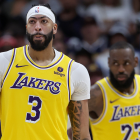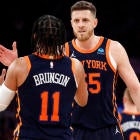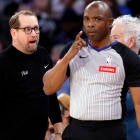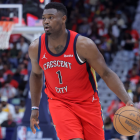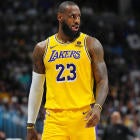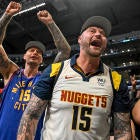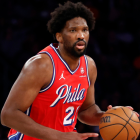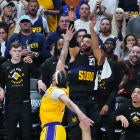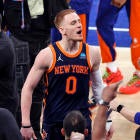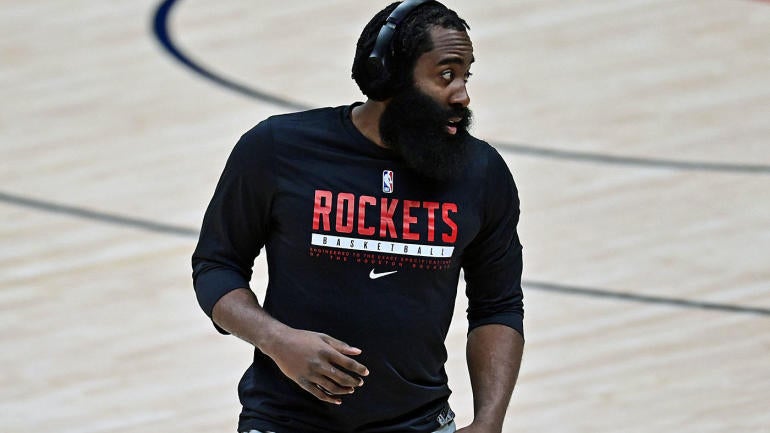
James Harden is getting the trade he wanted. The Houston Rockets are sending their former MVP to the Brooklyn Nets in a massive blockbuster deal that includes four teams and multiple star players, according to reports from ESPN's Adrian Wojnarowski and The Athletic's Shams Charania. Here is what the deal looks like in full, based on current reporting:
- Rockets get: Victor Oladipo, Rodions Kurucs, Dante Exum, four unprotected first-round picks (Brooklyn 2022, 2024 and 2026, Milwaukee 2022), and four unprotected first-round pick swaps (2021, 2023, 2025, 2027).
- Nets get: James Harden
- Pacers get: Caris LeVert, 2023 second-round pick (from Houston)
- Cavaliers get: Jarrett Allen, Taurean Prince
Harden has been pushing for a trade to the Nets, specifically, since initially requesting a trade during the offseason. He played with Kevin Durant with the Oklahoma City Thunder for the first three seasons of his career, and now that the two of them have reunited, Brooklyn should have the NBA's best offense by far.
The Rockets made the trade of Harden official on Thursday morning, with owner Tilman Fertitta thanking the superstar guard's time in Houston.
"On behalf of the entire Rockets organization and the City of Houston, I'd like to thank James Harden for an amazing eight-plus seasons in a Rockets uniform," Fertitta said. "James has provided us with so many great memories as we've watched him grow from Sixth Man of the Year to a perennial All-Star and MVP. My family and I also want to thank James for his many off the court contributions, including generous charitable donations and multiple annual community events. We wish James the best of luck and will always be grateful for the memories."
Considering how much they just gave up, though, the Nets still have work to do if they plan to build an all-around contender. After a hot start defensively, the Nets have given up 113.2 points per 100 possessions in their past eight games, ranking 25th in the league in that span. Harden is not known for his defense, and neither are most of the role players that remain in place. Still, the Harden-Durant pairing with a practically limitless supply of shooting should give Brooklyn quite a bit of leeway as they are likely to have the NBA's best offense.
That should only be confirmed when Kyrie Irving returns, but the fringe benefit of this deal for Brooklyn is that Harden provides a measure of insurance against either injury or personal absence on Irving's part. The Nets have two offensive superstars regardless of what happens with Irving now, and in all likelihood, will enter the playoffs with three of them.
The Rockets, meanwhile, appear headed for a full-scale rebuild, and it was one that they needed considering the assets they've already lost. Houston owes first-round picks to the Thunder in 2024 and 2026, as well as swap rights in 2021 and 2025, and with no path to immediate contention in sight, needed to use Harden to refill their coffers. They've done so with this deal, earning full control over Brooklyn's draft capital through 2027. The Nets may be dominant now, but once they age, those picks are going to become quite valuable. Meanwhile, in acquiring Oladipo, they've given themselves a path to short-term relevance. He and John Wall may both have injury concerns, but at their best, they are both All-Star-caliber players.
The deal may not grant the Rockets the franchise centerpiece they'd been hoping for, but it gives them more freedom to rebuild at their own pace without necessarily tanking. It will be a frustrating few years in Houston, but once Harden publicly declared the situation unfixable, the Rockets had no choice but to move on a deal. They've done so now, and in the process helped two other teams in need of retooling.
The Pacers were proactive in turning Oladipo, who will be a free agent at season's end, into LeVert, who is under contract through the 2022-23 season. The budget-conscious Pacers will now pay LeVert only $52.5 million over the next three seasons when they might have had to give Oladipo the max to keep him. The Cavaliers were in a somewhat similar position with Andre Drummond, whose contract expires after the season as well. They've replaced him with Allen, whose contract expires as well this offseason, but who is a restricted free agent. Cleveland can match any offer sheet made to him, and as he is only 22 years old, he fits the timeline of Cleveland's young lottery picks, Collin Sexton, Darius Garland and Isaac Okoro.
With the dust settled, this turned out to be one of the biggest trades in recent NBA history. Here's how all four teams involved did.
Brooklyn Nets: B
We'll start with the obvious: championships are won primarily through talent, and the Nets now have more of it than any other team in the Eastern Conference. The Lakers are the only other team in the NBA that can comfortably say that they have two top-10 players, but Brooklyn also has Kyrie Irving. The Lakers have no such third star. If you subscribe to the theory that talent wins out no matter what, the Nets are, at the very least, Eastern Conference favorites. They might be championship favorites too. But there's more work to be done here.
The proper Brooklyn grade here is incomplete. If the Nets go into the postseason with this exact roster, they are not going to win the championship. They're too thin and too weak defensively. But they aren't going to go into the postseason with this exact roster. Limited as their options may appear, the Nets could still have as many as three arrows left in their roster-building quiver:
- The taxpayer mid-level exception, which they elected not to use during the offseason, will allow them to sign a player on the buyout market for a pro-rated portion of $5.7 million, depending on when exactly they sign the player.
- A disabled player exception, which they have applied for in light of Spencer Dinwiddie's partially torn ACL. If the league rules that he will miss the season, the Nets will be awarded a $5.7 million exception (half of Dinwiddie's salary) to use in either the buyout market or in a trade.
- Dinwiddie's $11.4 million salary itself, and the full Bird Rights that come with it. A team interested in signing Dinwiddie this offseason, or merely looking to move off of some long-term salary, would be interested.
Despite their embarrassment of offensive riches, Brooklyn needs to do quite a bit with those chips if it plans to round out its roster. At a bare minimum, it needs to find a backup center. Right now, 2019 second-round pick Nic Claxton is second on the depth chart. He is currently injured and has played less than 200 NBA minutes. That center might need to be a starting-caliber player. Most metrics, to this point, have painted DeAndre Jordan as a bench-level player. His PER of 12 is below-average, he has a negative Box Plus-Minus (-1.6) and his VORP is zero, meaning the metric views him as a replacement-level player. Kevin Durant will play some center, but right now, the Nets are not equipped to deal with players like Joel Embiid or Anthony Davis in the playoffs.
Similarly, they'll need at least one more forward. That was a need prior to the Harden deal, and it remains one after Brooklyn failed to extract P.J. Tucker in this deal. Based on their present roster construction, the Nets have almost no choice but to use Durant to defend virtually any elite, big wing they encounter. Their playoff run will almost certainly include some combination of Jayson Tatum, Giannis Antetokounmpo, Jimmy Butler, LeBron James and Kawhi Leonard. Durant has proven capable of defending those players in the past, and having Irving and Harden limits his offensive burden enough to make it feasible, but is tiring out maybe the best player on the planet defensively really an optimal use of his talent? Throw in some guard depth, and the Nets still have a fair bit of work to do here.
And then, of course, there's the matter of redundancy. Golden State was so unstoppable with Durant, Stephen Curry and Klay Thompson because all three function so well off of the ball. Harden has never been asked to. Irving has never particularly liked to. Does that mean that this trio can't have the same impact on defenses that the Death Lineup did? Of course not. Given Brooklyn's shooting depth, there are scenarios in which this group is even better offensively. But that's not a slam dunk. Harden's usage rate as a Rocket was 33.3 percent, which would represent the highest figure in NBA history over an entire career. He vaulted above 40 percent at his peak. Something has to give here. All three of these stars are going to have to adjust. Their willingness to do so will determine just how great this offense can be.
And to be absolutely clear, it has a chance to be historically great. The most efficient offense in NBA history was the 2019-20 Mavericks. They scored 115.9 points per 100 possessions. Brooklyn was at 113.4 even before this trade, and that includes games that Irving has missed. There will be fit issues, but they don't need to be overwhelming. In very small samples, Harden has regularly topped 40 percent as a catch-and-shoot 3-point shooter. So has Irving. Durant just spent three seasons getting his doctorate in off-ball motion at Golden State University. There is a chance that this offense is so overwhelmingly dominant that nothing else matters. But for now, there are too many concerns elsewhere to give Brooklyn a perfect grade or championship favorite status. We'll have a far better idea of how well they'll fare in the playoffs once the trade deadline has passed and we've seen what additions they can make on the buyout market.
Houston Rockets: C
Trades don't exist in vacuums. The opportunity cost of a deal is as important as the actual cost, and the opportunity cost for Houston here was Ben Simmons. Based on the extensive reporting of Philadelphia's involvement in the Harden sweepstakes, it seems almost certain that the Rockets could have acquired a 24-year-old All-NBA forward for Harden had they not asked for so much more on top of him. Now, not only have the Rockets failed to add a young cornerstone, but they willingly gave away two chances at one on top of Simmons.
The two best young players in this trade were Caris LeVert and Jarrett Allen. Neither of them are going to be Rockets. Houston could argue that LeVert, a shaky shooter, wouldn't fit alongside Wall, and it could argue that Allen would prove redundant with Christian Wood and DeMarcus Cousins in the building, but those aren't considerations that should matter when dealing a player of Harden's caliber. The goal should strictly be finding pieces that could one day replace him, not desperately clinging to vague notions of short-term competitiveness. For Allen, they received Milwaukee's 2022 first-round pick. With Giannis Antetokounmpo under contract, that pick will almost certainly fall in the late 20s.
And for LeVert, they got Victor Oladipo, a player that is two years older and comes with more recent injury concerns. Now, Oladipo has looked mostly like the All-NBA player that he was in 2018 so far this season, but that raises other concerns. LeVert comes with three years of team control. Oladipo, on the other hand, is a free agent after the season. That gives him supreme leverage over the Rockets. They can either re-sign him at an exorbitant rate, knowing that he essentially just missed two full seasons due to injury, or they can let him walk knowing that it means they gave up Caris LeVert for nothing. Yikes.
All of that being said, the players involved here are largely window dressing. Houston did this for Brooklyn's draft capital, and risky as that approach appears, the upside is enormous. Durant is 32. Harden is 31. Irving is 28 and has injury issues. Even in Brooklyn's best-case scenario of winning multiple championships, that core isn't exactly built to last. In fact, all three have player-options after the 2021-22 season. If things go south here, Brooklyn could lose all three and be without control over its first-round picks for five full years after that. Yes, the New York market could help them lure future free agents, but would players be eager to commit to Brooklyn if this situation faltered? Houston could find itself in the same position Boston did after trading Kevin Garnett and Paul Pierce to Brooklyn: perpetually adding high lottery picks from a team with no immediate path to improvement.
But that's not exactly a certainty, and that's a problem when some degree of certainty was on the table. Houston could have had Simmons. It could have had LeVert and Allen. It chose to bet fully on the lottery, and where those ping pong balls ultimately fall is going to determine the success or failure of this trade for the Rockets.
Indiana Pacers: A-
The Pacers are one of the thriftiest teams in basketball. They haven't paid the tax since the formula became more punitive in 2011, and prior to this season, had one of the seven lowest payrolls in the league six seasons in a row. That put them in a very precarious situation when it came to Oladipo. If he failed to return to form after two years of rehab, they wouldn't have the talent to contend this season regardless. But if he did, Indiana's salary structure would have become significantly more complicated. The Pacers already have around $102 million committed for next season. If they had to pay Oladipo something resembling the max (a near certainty given the suddenly weak free-agent class), they would have vaulted into tax territory for a non-championship-caliber roster.
LeVert solves that problem perfectly. He's under contract for the next two seasons beyond this one for only around $36 million, which might amount to around half of what Oladipo gets from Houston or on the open market. That saves the Pacers from the tax over the next two seasons, but it also got them out from under the tax line this season as well. The deal saves Indiana around $4.8 million this season, which will grant needed flexibility at the trade deadline.
And then, of course, there's the argument that LeVert is simply more valuable than Oladipo as a player. That is hardly a slam dunk, but LeVert should be able to handle the ball more as a Pacer than he did in Brooklyn, and in small samples, he has thrived as a primary creator. Indiana lineups featuring Malcolm Brogdon, Myles Turner and T.J. Warren should be able to space the floor well for him, and he's two years younger than Oladipo. He's not the defender or shooter Oladipo is, two traits the Pacers will sorely miss, but considering their contracts, LeVert is far and away the more valuable asset for Indiana.
Cleveland Cavaliers: A
There's no such thing as a perfect trade, but Cleveland came about as close to it as any team could with this deal. While the Cavaliers are loaded with big men, most of them are either in their prime or about to exit it. By the time Collin Sexton and Darius Garland are ready to win at the highest levels, Andre Drummond and Kevin Love probably won't be. Drummond is on an expiring deal as is, and while his market hasn't exactly been robust in the past (Cleveland got him for only a second-round pick), committing long-term money of any sort to a non-shooting center entering his age-28 season is risky business.
So they pivoted into Allen, who is also due for a new contract this offseason but is a safer bet at only 22 years old. Allen has blossomed alongside star-level talent in Brooklyn, averaging career highs in points, rebounds, assists, blocks and field goal percentage this season, and while Cleveland won't be able to surround him with nearly as many weapons, it should eventually be able to give him the undisputed starting slot that Brooklyn was hesitant to grant with DeAndre Jordan in the building. The Cavs, in essence, managed to add their likely long-term starter at center without giving up much of anything.
The first-round pick they surrendered in the deal originally belonged to Milwaukee. With Giannis Antetokounmpo re-signed during the offseason, that pick will almost certainly fall in the late 20s. Dante Exum represents the salary filler, but his inability to stay on the floor has made him more of a liability than an asset. All in all, a late first-round pick and a high-risk, low-reward young player seems like a small price to pay for long-term stability at the center spot. That's what Cleveland has secured here. That it also gets to take a flier on Prince is a nice bonus.














